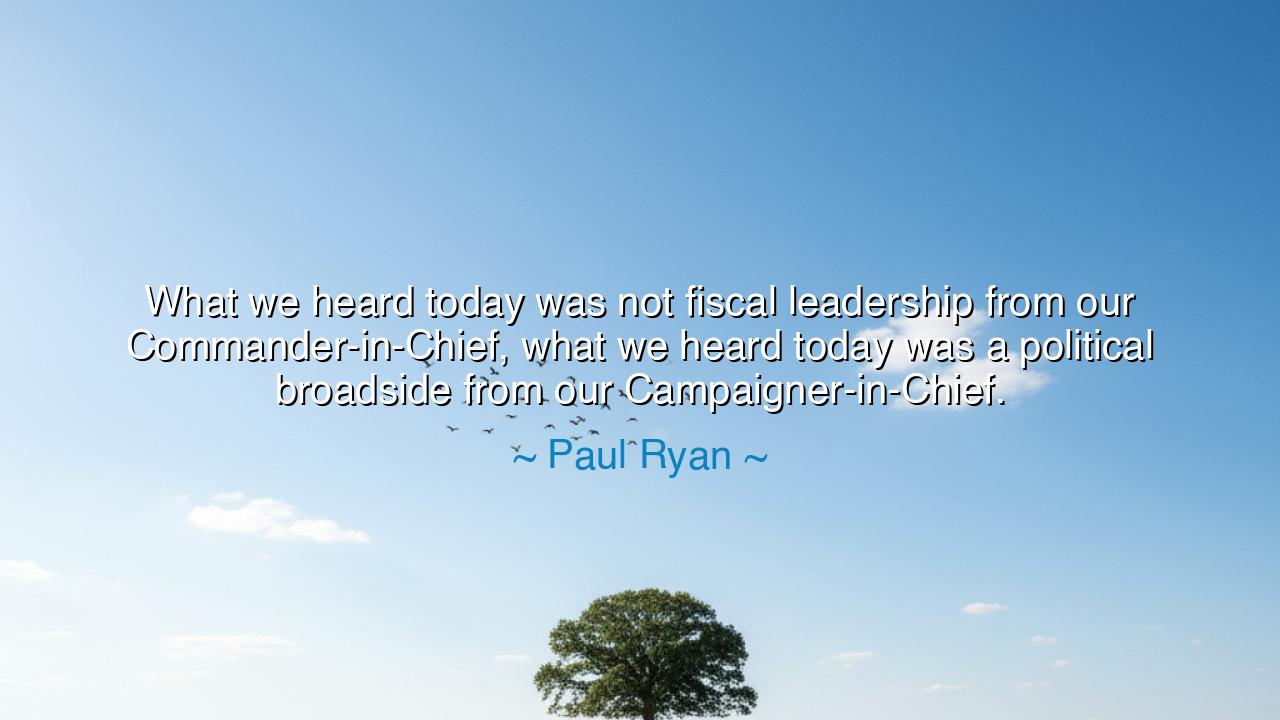
What we heard today was not fiscal leadership from our
What we heard today was not fiscal leadership from our Commander-in-Chief, what we heard today was a political broadside from our Campaigner-in-Chief.






In the resolute and cutting words of Paul Ryan, we hear the voice of a statesman disillusioned by the theater of politics: “What we heard today was not fiscal leadership from our Commander-in-Chief, what we heard today was a political broadside from our Campaigner-in-Chief.” This statement, though born from the heat of modern governance, speaks with the timeless tone of one who yearns for integrity over performance, duty over vanity. Beneath the sharpness of his rebuke lies an ancient truth: that the difference between a leader and a campaigner is the difference between one who serves and one who seeks power.
The origin of this quote comes from an era of deep division in American politics, when the nation’s leaders grappled with the burdens of debt, budget, and responsibility. Paul Ryan, then a congressman and later Speaker of the House, uttered these words in response to what he viewed as political rhetoric disguised as economic policy. His critique was aimed not at words alone, but at a spirit — a spirit of ambition that, in his eyes, had replaced the humility of stewardship. He was lamenting the loss of fiscal leadership, the wisdom to guide a nation’s wealth not for applause, but for posterity.
Ryan’s phrase “Commander-in-Chief” and “Campaigner-in-Chief” draws upon an ancient contrast: that between the ruler and the demagogue. The Commander-in-Chief is the guardian of order, the one who carries the weight of the people’s burdens upon his shoulders, who governs with discipline and foresight. The Campaigner-in-Chief, by contrast, is the performer — the one who speaks to please, who wins the crowd but loses the course. This contrast is not new. The philosophers of Greece and Rome warned of it long ago. Plato, in his Republic, spoke of the “rhetoricians,” those who sought to rule through persuasion rather than principle. He feared them, for they could lead a city not to truth, but to ruin.
Consider the story of Pericles, the Athenian statesman who led with brilliance but also sowed the seeds of his city’s destruction. In the early days, Pericles ruled with restraint and fiscal wisdom, guiding Athens to prosperity through discipline and prudence. Yet as he grew more adored, he began to speak not to instruct, but to inspire the passions of the crowd. His later policies, driven by ambition and pride, led to war — and Athens, that great light of the ancient world, was consumed by its own divisions. So too does Ryan’s warning echo across centuries: when leaders seek to campaign rather than to govern, the realm begins to tremble beneath the weight of its unkept promises.
In Ryan’s words we also find the call for accountability — the reminder that a nation’s prosperity depends not on charisma, but on courage. Fiscal leadership is not the art of spending, but the discipline of stewardship. It demands the restraint to say “no” when the world shouts for “yes,” the wisdom to preserve wealth for future generations, and the humility to place the common good above political triumph. A Campaigner-in-Chief may win hearts with rhetoric, but a Commander-in-Chief preserves lives with wisdom. It is the difference between momentary glory and enduring greatness.
There is, too, a lesson here for all who lead — not only in government, but in life. Every person, at some moment, stands between these two selves: the leader and the campaigner. One speaks for approval; the other acts for truth. The leader endures criticism for doing what is right; the campaigner sacrifices rightness for the comfort of praise. The ancients would say that the first walks the path of honor, while the second walks the path of shadow. Thus, Ryan’s lament is more than political — it is moral. It calls each of us to govern our own souls with integrity, to choose substance over spectacle.
So let this be the lesson for all generations: seek leadership, not applause; truth, not convenience. The world will always tempt you to become a campaigner — to speak words that please, to chase victories that vanish. But the wise man, the true leader, knows that the highest service is not to oneself but to the greater good. Whether you rule a nation, guide a household, or lead your own heart through the storms of life, remember: the measure of your greatness is not how loudly you speak, but how steadfastly you serve.
For in the end, history does not remember the campaigner who sought praise, but the commander who bore responsibility with courage. The voices of the vain fade quickly, but the deeds of the faithful endure. And so, as Paul Ryan reminds us through the mirror of his time, leadership is not a performance — it is a covenant. Honor it, and your legacy will stand unshaken, even when the applause has long since died away.






AAdministratorAdministrator
Welcome, honored guests. Please leave a comment, we will respond soon